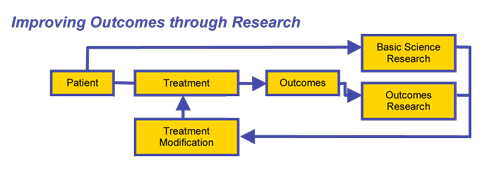Congenital heart malformations are the most common type of birth defect, with an incidence among live births of nearly 1%. Congenital heart disease (CHD) affects more children each year than pediatric cancer and pediatric AIDS combined. Only 30 years ago, the most severe CHD defects, such as hypoplastic left heart syndrome, were untreatable and universally fatal. However, groundbreaking research from centers like the University of Michigan has led to dramatic improvements in outcome for these types of severe CHD. Similar improvements have occurred across the spectrum of cardiac malformations resulting in an estimated one million adult survivors of CHD in the United States. While survival remains paramount, research efforts have now turned to a more patient and family-centered focus to maximize other quality of life outcomes, including growth, neurodevelopment, physical and functional capacity, behavior and social adjustment, and minimizing the impact on the family.
Since we appreciate the need to understand how all these components impact overall outcomes, we are developing hard data to guide us on how to optimize treatment, and educate parents and children to best enhance their long-term well being. Thus, a new paradigm is developing, whereby novel ways of linking outcomes and basic science research to care pathways interact in a self-perpetuating loop, resulting in optimal patient outcomes.
Our clinical research is conducted under the aegis of M-CHORD (Michigan Congenital Heart Outcomes Research and Discovery). For more information on our multidisciplinary team and the variety of research projects currently under way, follow the link below:
http://www.mottchildren.org/medical-services/ped-heart/research-and-innovation

Michigan Congenital Heart Outcomes Research and Discovery: M-CHORD
Only through the coordinated efforts of investigators with a wide range of expertise can we achieve our vision of linking basic science, clinical care, and long-term outcomes to optimize not only the quantity (e.g. survival), but the quality of life for our patients. This vision for a new multidisciplinary research paradigm partnering clinical and research experts led to the development of M-CHORD (Michigan Congenital Heart Outcomes Research and Discovery).
The goals of M-CHORD revolve around a central theme of determining the optimal treatment algorithms for patients with CHD to ensure the best possible long-term functional outcomes. To achieve this mission, M-CHORD has established the following aims:
- Conduct basic science and outcomes research to guide clinical decision making and develop new management strategies
- Test new strategies through prospective clinical trials and epidemiologic studies
- Advance patient and parent education to improve self-care and long-term management of the child, and improve satisfaction with the treatment experience
- Develop the next generation of physician-scientists in CHD who will gain opportunity and experience in conducting clinical translational research.
Treatment of cardiovascular disorders remains a major medical challenge. Pharmacological interventions, mechanical assist devices and heart transplantation have provided life saving options. While heart transplantation has been the most successful treatment modality for end stage heart failure, chronic shortage of donor organs has limited widespread applicability.
With this vision, M-CHORD was formed in collaboration with individuals from different clinical and scientific backgrounds who share a common interest in the patient with CHD. Each member brings complementary areas of nationally and internationally recognized expertise in their field to form this unique multidisciplinary team.
